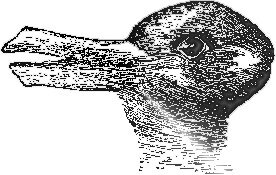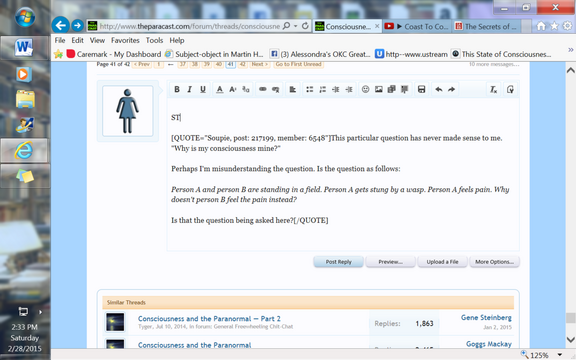This particular question has never made sense to me. "Why is my consciousness mine?"
Perhaps I'm misunderstanding the question. Is the question as follows:
Person A and person B are standing in a field. Person A gets stung by a wasp. Person A feels pain. Why doesn't person B feel the pain instead?
Is that the question being asked here?
Looky here (the ****** means I think this bit is very important):
"Tononandonandoni's fictional Galileo meets Nagel in a purgatorial region of his dream, complete with a scared (and scary) bat; as Nagel famously argued in his seminal essay “What Is It Like to Be a Bat?” it is like
something to be one. Tononi doesn’t think it much matters that we don’t know what it’s like to be a bat: bats have their qualia and we have ours.
*****But he misses, or nearly misses, the force of Nagel’s critique. Nagel’s deepest question about consciousness is not provoked by the sheer fact of conscious experience.
It’s the
plurality of consciousness that’s strange.
No objective scientific account of all the elements in the universe could say why I am me and you are you. Objectively speaking, we could accept that there are many different conscious beings. But we don’t have the ghost of an idea of how there could be an objective explanation for the distribution of subjectivities among them. Why is my consciousness
mine? Why isn’t your consciousness mine? The hard question of consciousness is less this question, “How can consciousness exist?” than the question of how there can be more than one. What is the principle of discrimination between them?"
Now when I ran that by
@Pharoah (who I hope is, per my instructions, currently ignoring me on the forum (to a mutually higher end ) he said this was almost exactly it ... but I think he too misses the force of Nagels critique only to rewrite it as the problem of the noumenal - and that's why it doesn't make sense to us when he says ive solved the hard problem, long live the hard problem in the form of the noumenal ... because they are the same ding dang thang.
So what Pharoah understands as the noumenal problem, we just call the hard problem 1.0.
What I think ( very tentatively ) HCT does when he claims it solves the hard problem ... is instead answer how can consciousness exist as framed in this paragraph below ( by the author above, as above - so below):
"The hard question of consciousness is less this question, “How can consciousness exist?” than the question of how there can be more than one. What is the principle of discrimination between them?"
For the Trifecta I think Dowel is trying to undermine Jackmers by misunderstanding this same point ... but he'll I could be lying at this point for all I know.
Questions? .... anyone ... anyone ... Buehler?



